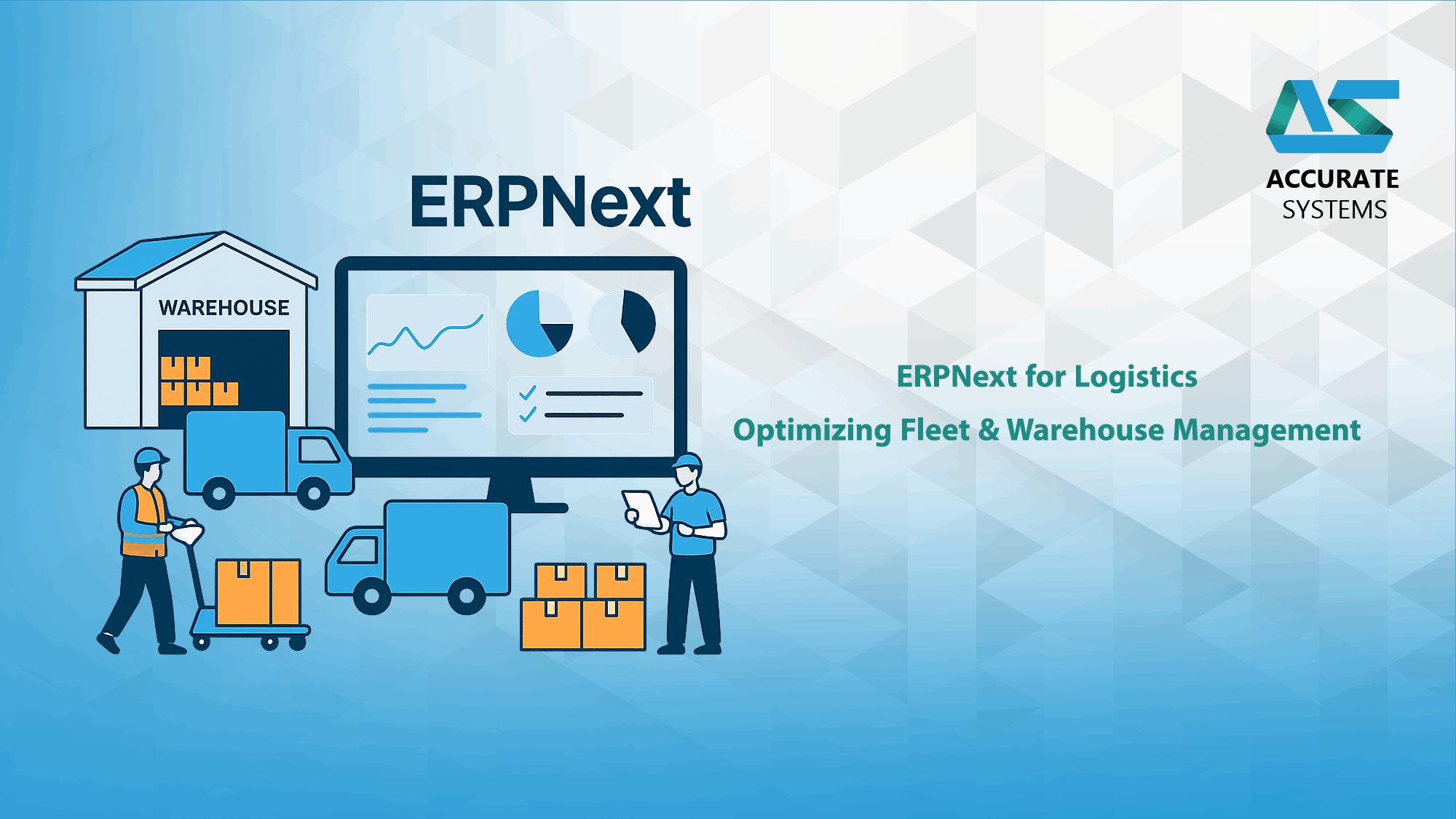The Importance of ERP in Logistics
In the modern supply chain landscape, logistics plays a mission-critical role in ensuring products move efficiently from origin to consumption. Whether managing last-mile delivery, global freight operations, or e-commerce fulfillment centers, logistics providers face challenges like unpredictable demand, high delivery expectations, fragmented systems, and pressure to reduce operating costs.
An ERP (Enterprise Resource Planning) system consolidates logistics operations into a centralized, integrated environment. It connects warehouse operations, fleet management, inventory control, procurement, and sales into one real-time platform. ERPNext, a robust and customizable open-source ERP, provides logistics businesses with tools to manage every aspect of their supply chain with agility, accuracy, and data-driven intelligence.
Key ERPNext Features for Warehouse and Fleet Management
ERPNext offers a comprehensive suite of tools tailored to logistics and transportation companies. From warehouse operations and inventory tracking to vehicle usage and maintenance, ERPNext covers every logistics function.
✅ Warehouse Management
- Multi-Warehouse Setup: Manage separate locations with granular control over each warehouse’s operations and stock levels.
- Real-Time Inventory Visibility: Live updates on stock availability, item movement, and order status across locations.
- Putaway and Picking Optimization: Smart suggestions based on item turnover, reducing time and travel distance for warehouse staff.
- Cycle Counts and Stock Audits: Enable periodic inventory checks to ensure accuracy and prevent discrepancies.
- Returns Management: Simplify the handling of damaged or returned goods with clear stock reallocation workflows.
- Custom Print Formats: Generate picking slips, delivery notes, and barcode labels tailored to your workflow.
✅ Fleet and Transportation Management
- Fleet Database and Lifecycle Management: Maintain vehicle registration, capacity, service history, insurance status, and depreciation tracking.
- Route Planning and Geo-Zoning: Assign vehicles and optimize routes based on customer zones and delivery windows.
- Fuel Usage and Cost Logs: Record fuel fills, consumption rates, and per-kilometer efficiency to optimize usage.
- Driver Shift Scheduling: Allocate shifts, track working hours, and manage driver compliance certifications.
- Service Logs and Predictive Maintenance: Automate service reminders and reduce downtime with proactive maintenance scheduling.
- GPS & IoT Integration: Connect with GPS tracking devices or third-party telematics for real-time vehicle monitoring.
✅ Order Fulfillment & Transport Documentation
- Delivery Note Automation: Generate transport documents with linked sales orders, packing lists, and invoices.
- Proof of Delivery (POD): Enable electronic capture of POD signatures, delivery status, and feedback via mobile.
- Gate Entry Logs: Control inbound and outbound movement of goods and vehicles at warehouse gates.
✅ Integration with Sales, Procurement, and Finance
- Linked Sales Orders & Fulfillment: Track every delivery back to its originating customer order.
- Supplier & Purchase Management: Automate vendor comparisons, purchase requests, and freight contract evaluations.
- Invoicing & Freight Costing: Record freight charges, fuel surcharges, and calculate total delivery costs per order.
- Multi-Currency & Tax Compliance: Handle cross-border logistics with built-in tax rules and exchange rate support.
✅ Analytics & Reporting
- Custom Dashboards: Visualize fleet performance, top-selling items, low-stock alerts, and delivery KPIs.
- Operational Reports: Analyze warehouse throughput, average delivery time, and fulfillment accuracy.
- Cost-to-Serve Analysis: Calculate shipping cost per order or SKU to improve pricing strategies.
- Driver and Vehicle Scorecards: Benchmark reliability, fuel efficiency, and compliance levels.
Benefits of ERPNext for Logistics Companies
Implementing ERPNext delivers tangible benefits to logistics service providers, 3PL companies, and distribution centers:
- Improved Visibility: Gain a complete view of warehouse and fleet activities through one centralized dashboard.
- Greater Accuracy: Minimize human error with real-time stock reconciliation, barcode scanning, and automated workflows.
- Reduced Operational Costs: Track cost drivers like fuel, downtime, and labor to identify and eliminate inefficiencies.
- Streamlined Delivery Experience: Shorten delivery cycles, provide real-time tracking to clients, and reduce missed deliveries.
- Regulatory Readiness: Keep accurate digital logs for audits, tax compliance, and customs processing.
- Seamless Collaboration: Unify warehouse teams, dispatchers, procurement staff, and finance under one platform.
- Scalable Growth: Easily expand across multiple regions, fleets, or warehouse locations with centralized management.
Conclusion
ERPNext is a complete ERP solution for logistics providers seeking efficiency, transparency, and cost control. With robust features for fleet and warehouse management, integrated supply chain tools, and real-time reporting, ERPNext empowers logistics businesses to optimize performance and scale with confidence.
From route optimization to inventory automation, ERPNext helps logistics companies modernize their operations and deliver a superior customer experience.
#ERPNext #LogisticsERP #WarehouseAutomation #FleetManagement #SupplyChainTechnology #DigitalLogistics #OpenSourceERP #InventoryTracking #TransportSoftware #FreightOptimization


Leave A Comment